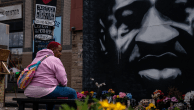From posting hashtags to finding like-minded communities, social media has transformed where, when and how people engage with civic and political activities. This chapter uses survey data to explore online activism on social media, including the ways people are engaging with issues they care about and the value they place on these platforms when it comes to building community and sharing their views.
This work also explores the online and offline ways people have engaged with one of the most recognizable topics in online activism in the last decade: Black Lives Matter.
Political and civic engagement on social media
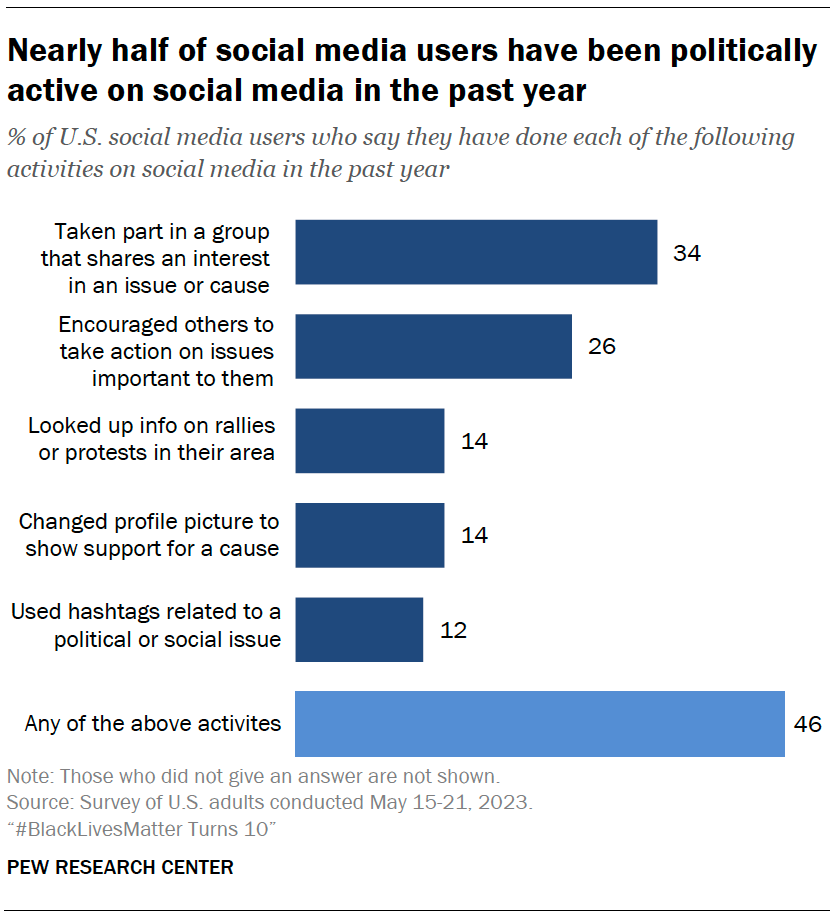
Some people are turning to social media to engage with the political and social issues they care about. This survey asks about five activities related to causes or issues that people may have done on social media in the past year.
About one-third of social media users (34%) say they have taken part in a group that shares an interest in an issue or cause, while a smaller share (26%) say they have encouraged others to take action on social media in the past year.
Smaller shares have looked up info on protests or rallies happening in their area (14%), changed their profile picture to support a cause (14%) or used hashtags related to a political or social issue (12%) in the past year.
Taken together, 46% of social media users say they have done at least one of these activities in the past year.
Black users stand out for their activity on social media, with a majority (58%) saying they’ve participated in at least one of these activities in the past year, compared with less than half each among White (45%) and Hispanic (40%) users. Asian users do not significantly differ from their Black, White or Hispanic counterparts: 49% say they have done at least one of these activities in the past year.
In particular, Black users are more likely to have changed their profile picture to support a cause: One-quarter of Black social media users say they have done this in the past year, while smaller shares of Hispanic (15%), Asian (15%) and White (11%) users say the same.
Democrats and Democratic-leaning users are also more likely than their Republican counterparts (53% vs. 41%) to have engaged politically on social media in any of these five ways. One of the largest gaps is in finding information about rallies or protests happening in their area: 20% of Democratic social media users have done this in the past year, compared with 9% of Republican users.
Personal importance of social media for political action
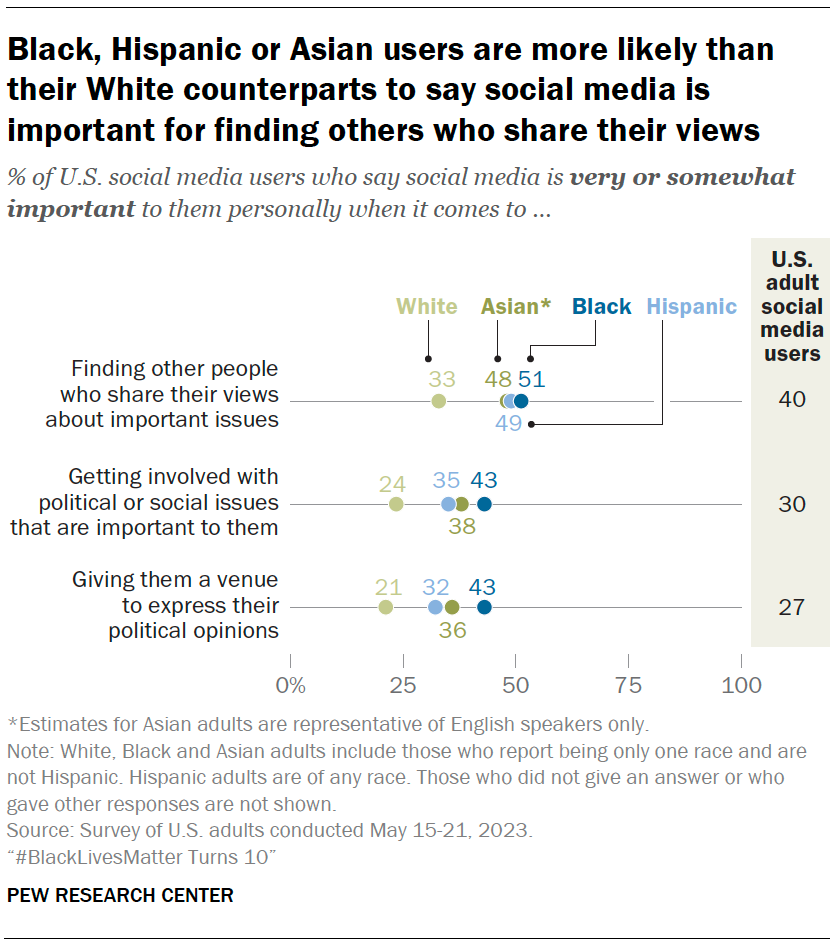
Four-in-ten social media users say these platforms are very or somewhat important to them personally when it comes to finding others who share their views about important issues. Smaller shares say the same for getting involved with political or social issues that are important to them (30%) or giving them a venue to express their political opinions (27%).
The share of social media users who say online platforms are important for each of these reasons has decreased since the last time the Center asked this question in June 2020, following massive protests after the killing of George Floyd. For example, the share of users who said social media is an important venue for expressing their political opinions has declined from 40% in 2020 to 27% today.
As was true in previous Center surveys, the level of importance that users place on these platforms for their own political engagement continues to vary by race and ethnicity.
Roughly half of Black, Hispanic and Asian users say social media is very or somewhat important for finding other people who share their views about important issues, compared with one-third of White users who say this. Black, Hispanic and Asian users also place a higher level of importance on social media than White users when it comes to getting involved with issues they care about or giving them a place to express their political views.
There are also differences in the personal importance of social media by age and political party, which are displayed in the appendix.
Positive and negative impacts of social media on political discourse
The survey also sheds light on how Americans overall – not just those who use social media – think about these platforms’ impact on society and civic life. The public offers up a mix of criticism and praise for these sites.
On the more negative side, clear majorities of Americans overall – including those across racial and ethnic groups – say the statement that “social media distracts people from issues that are truly important” (82%) or “makes people think they’re making a difference when they really aren’t” (76%) describes social media very or somewhat well.
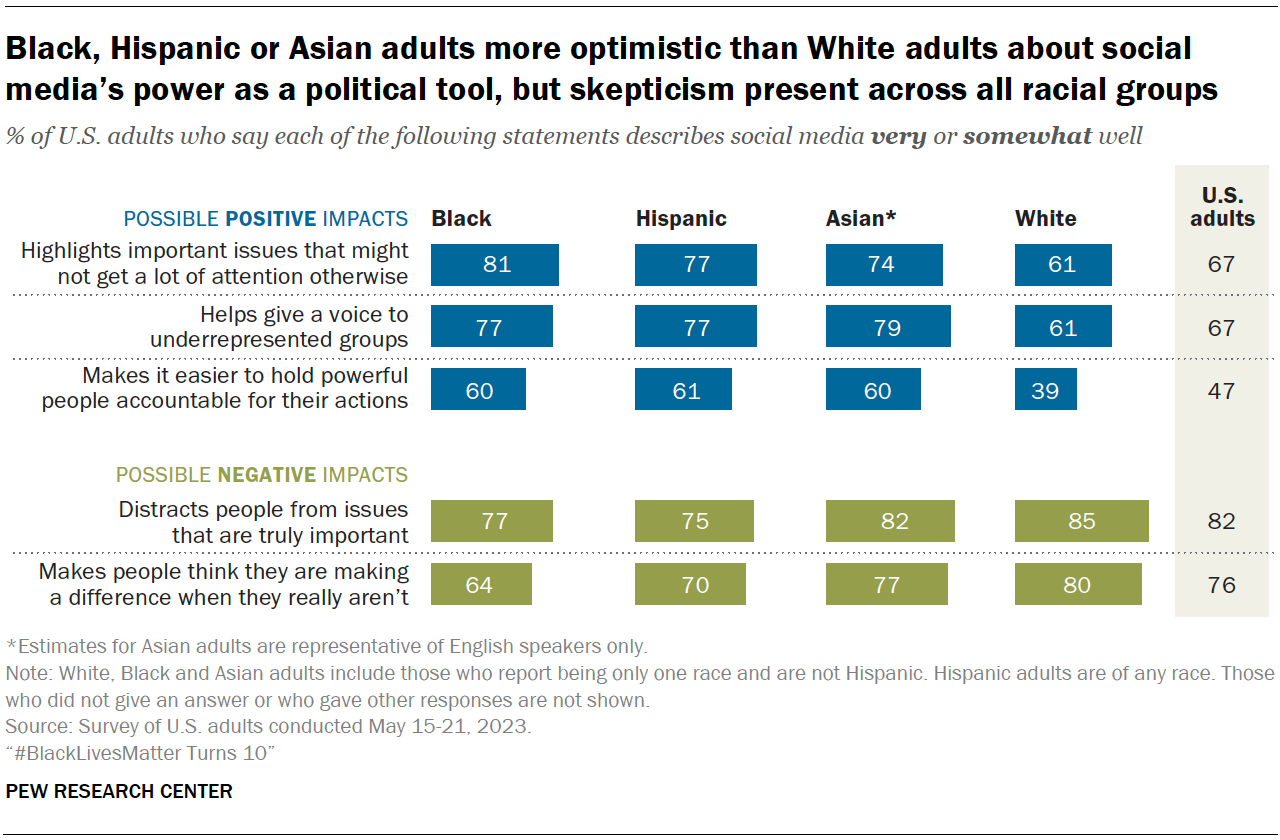
Still, the public broadly agrees social media can be a helpful tool for shedding light on underrepresented stories or communities. Two-thirds each say social media “highlights important issues that might not get a lot of attention otherwise” and “helps give a voice to underrepresented groups,” while roughly half (47%) believe the statement “social media makes it easier to hold powerful people accountable for their actions” describes these platforms well.
People’s assessment of social media’s impact varies widely by race and ethnicity. While about six-in-ten each among Black, Hispanic and Asian adults say social media helps hold the powerful accountable, that share drops to 39% among White adults.
Views of social media highlighting important issues that might otherwise go unnoticed or giving a voice to underrepresented groups follow a similar pattern – with Black, Hispanic and Asian Americans more likely to agree with this statement than their White counterparts.
White Americans are more negative than Black or Hispanic Americans about the impact of these platforms on political engagement. White adults (80%) are more likely than Black (64%) or Hispanic adults (70%) to say the statement “social media makes people think they are making a difference when they really aren’t” describes these sites well.
Asian adults (77%) are more likely than Black adults to say social media creates a false sense of changemaking, but do not differ significantly from Hispanic or White adults.
For differences by age, political party and social media use, see the appendix.
Support for and opposition to Black Lives Matter on social media
In addition to measuring Americans’ views about online activism more broadly, the survey also focused on people’s engagement with content directly related to Black Lives Matter.
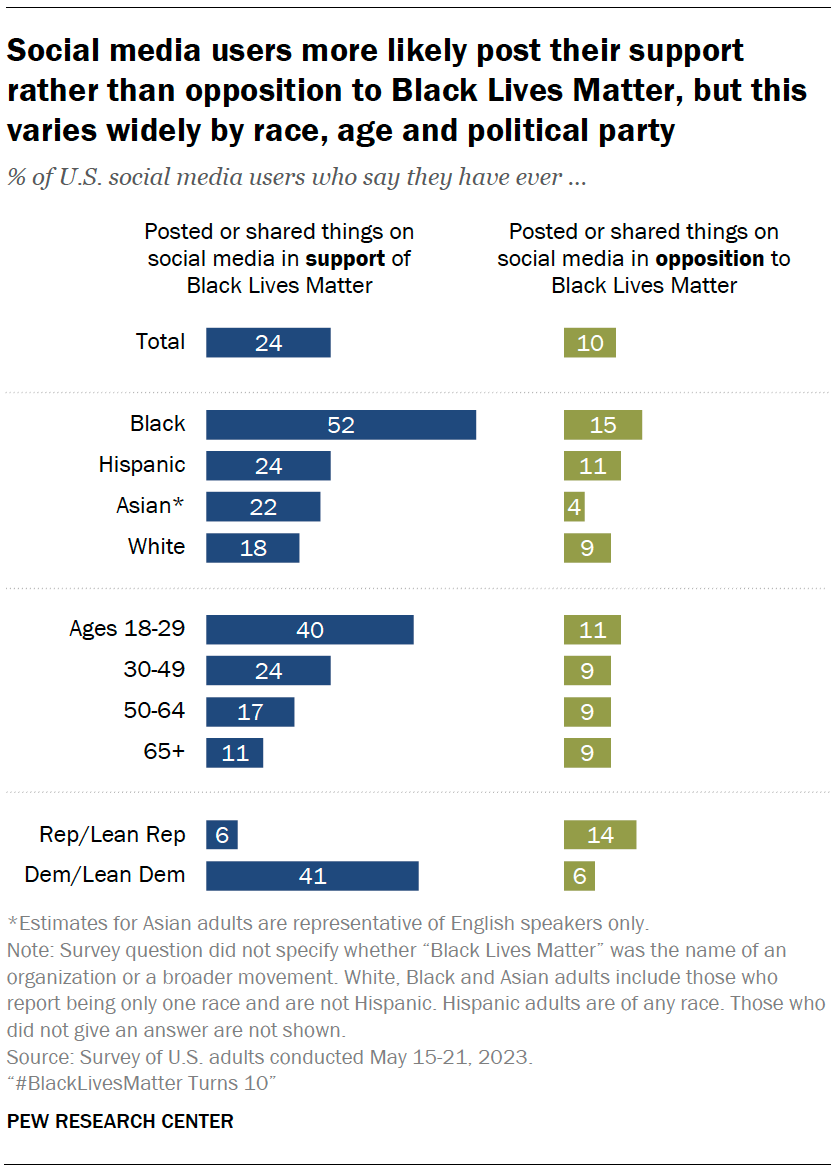
While most social media users (77%) have come across content related to Black Lives Matter, far fewer have shared their personal views – whether positive or negative – about this on social media.
Overall, 24% of social media users say they have ever posted or shared things on these sites in support of Black Lives Matter, while a smaller share (10%) say they have posted things in opposition. But both actions vary widely by race and ethnicity, age, and political party.
Roughly half of Black social media users (52%) say they have posted or shared things in support of Black Lives Matter, compared with smaller shares of Hispanic (24%), Asian (22%) and White (18%) users.
Racial and ethnic differences are more modest when looking at those who have voiced their opposition on social media. Still, Asian users are less likely than Black, Hispanic or White users to share content opposing Black Lives Matter.
Younger adults are more likely than their older peers to voice their support of Black Lives Matter on social media. Four-in-ten users ages 18 to 29 say they have done this, compared with 24% of those 30 to 49 and an even smaller share of those 50 and older. However, there are no meaningful age differences among those who post disapproving content.
Partisan differences are also present. Much larger shares of Democratic rather than Republican users say they have posted things in support of Black Lives Matter (41% vs. 6%). More modest gaps exist when asked about posting things in opposition: 14% of Republican users report sharing content opposing Black Lives Matter on social media, compared with 6% of Democratic users.
Racial and age differences in being politically active on social media
Younger Black social media users consistently stand out for their higher levels of political engagement on social media and the importance they place on that engagement.
In this survey, we ask whether users have done each of five issue-based actions on social media in the past year, including taking part in a group related to a cause and encouraging others to take action on issues. Roughly two-thirds of Black social media users ages 18 to 49 (64%) have done at least one of these activities in the past year, compared with fewer than half of White or Hispanic users under 50 and 48% of older Black users.
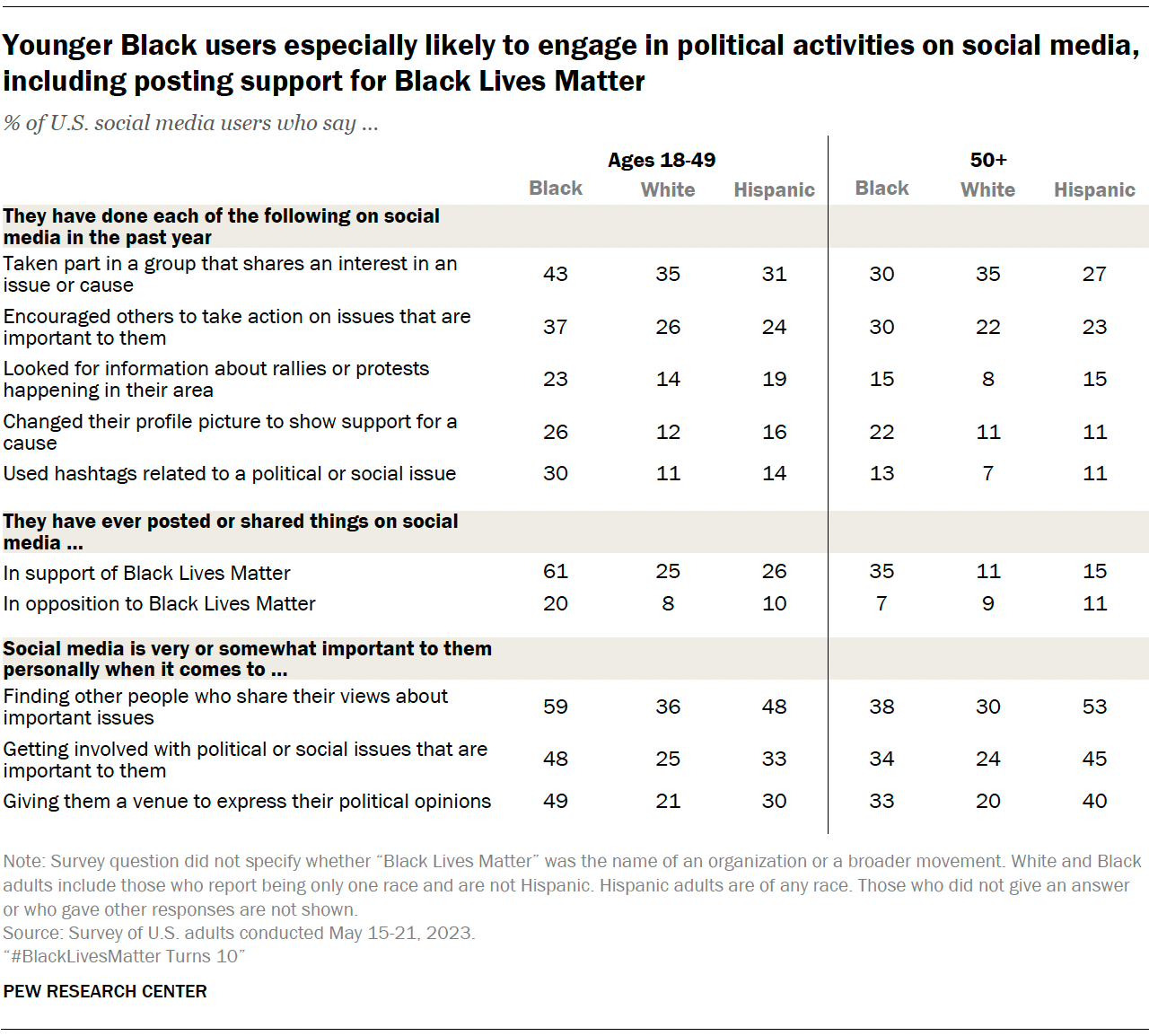
This pattern is also true when looking at activities that amplify Black Lives Matter. While 61% of Black social media users under 50 say they have posted or shared things in support of Black Lives Matter, that share drops to 35% among older Black users and even is smaller among White and Hispanic users, regardless of age. Notably, a somewhat similar pattern is also seen for sharing opposition, with one-fifth of younger Black users having posted their opposition to Black Lives Matter on social media.
Social media also holds a high personal importance for many younger Black users. A majority of Black users ages 18 to 49 (59%) say social media is very or somewhat important to them for finding other people who share their views about important issues. Some 48% of younger Hispanic users say this, as do smaller shares of Black users 50 and older (38%) and younger White users (36%). The same pattern holds when looking at the shares of each group who say social media is important to them for getting involved with political or social issues and giving them a venue to express political opinions.
Attending Black Lives Matter protests
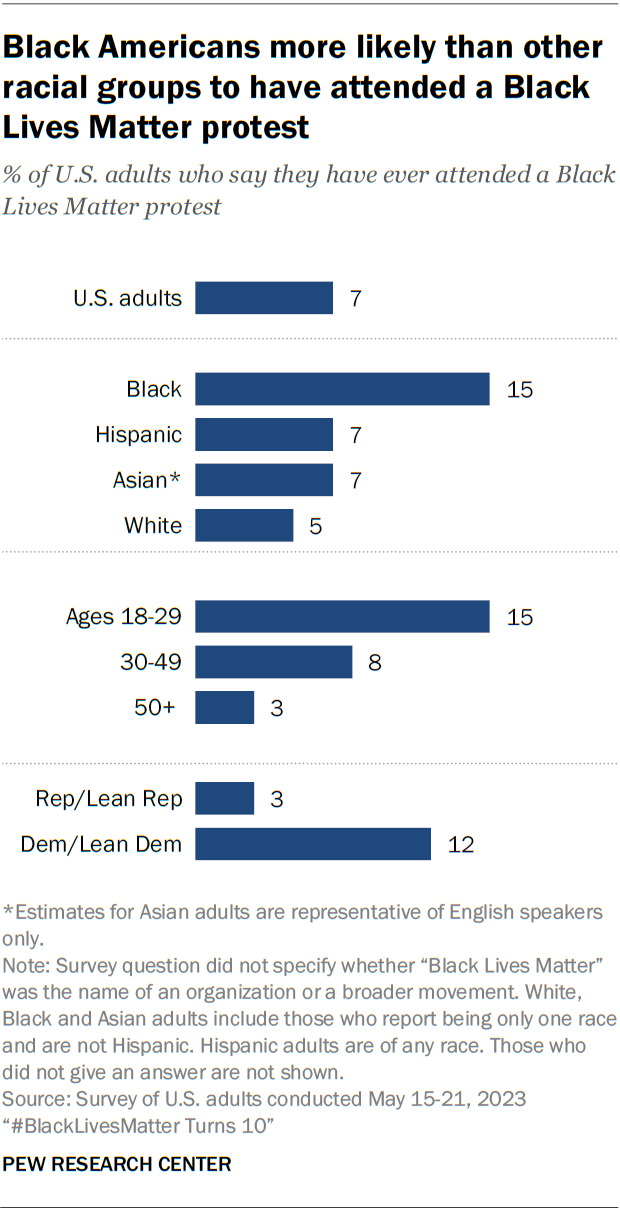
Massive protests and demonstrations have been a mainstay of the Black Lives Matter movement – often swelling around high-profile killings of Black Americans by law enforcement.
This survey finds that 7% of Americans say they have ever attended a Black Lives Matter protest, and those who have done so are more likely to be younger, Black and identify with the Democratic party.
Black Americans (15%) are more likely than those who are Hispanic (7%), Asian (7%) or White (5%) to say they have attended a Black Lives Matter protest.
Age differences on this question are also pronounced: 15% of Americans ages 18 to 29 say they have attended a Black Lives Matter protest, compared with 8% of those 30 to 49 and 3% of those 50 and older.
And Democrats are more likely than Republicans to say they have attended a Black Lives Matter protest (12% vs. 3%).
Views on police violence against Black people
One of the central discussions around criminal justice in recent years focuses on the relationship between policing and racial bias – particularly the violent and fatal encounters that Black people have with law enforcement.
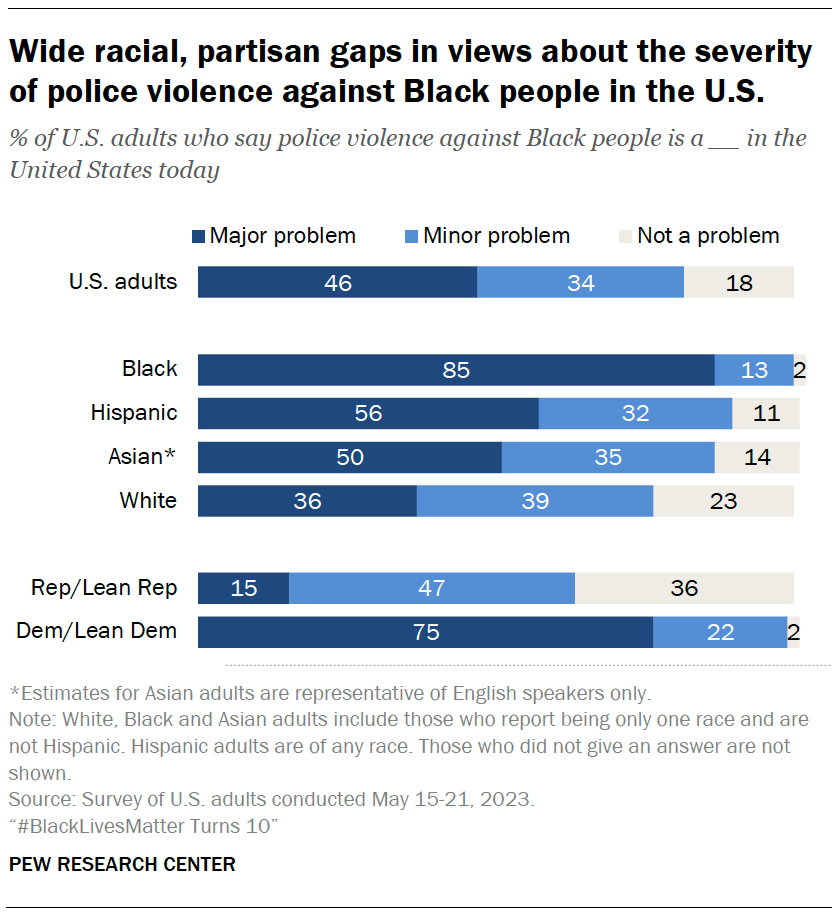
This survey finds that roughly eight-in-ten Americans say police violence against Black people in the U.S. is a major (46%) or minor (34%) problem. Another 18% say this is not a problem in this country.
While majorities say police violence against Black people in the U.S. is a problem, groups differ over how big of an issue it is. For example, 85% of Black adults describe this as a major problem, compared with 56% of Hispanic adults, 50% of Asian adults and 36% of White adults.
There are also striking partisan differences. Democrats are far more likely than Republicans to describe police violence against Black people as a major issue in the U.S. (75% vs. 15%).
How effective are social media and news organizations in bringing awareness to police misconduct?
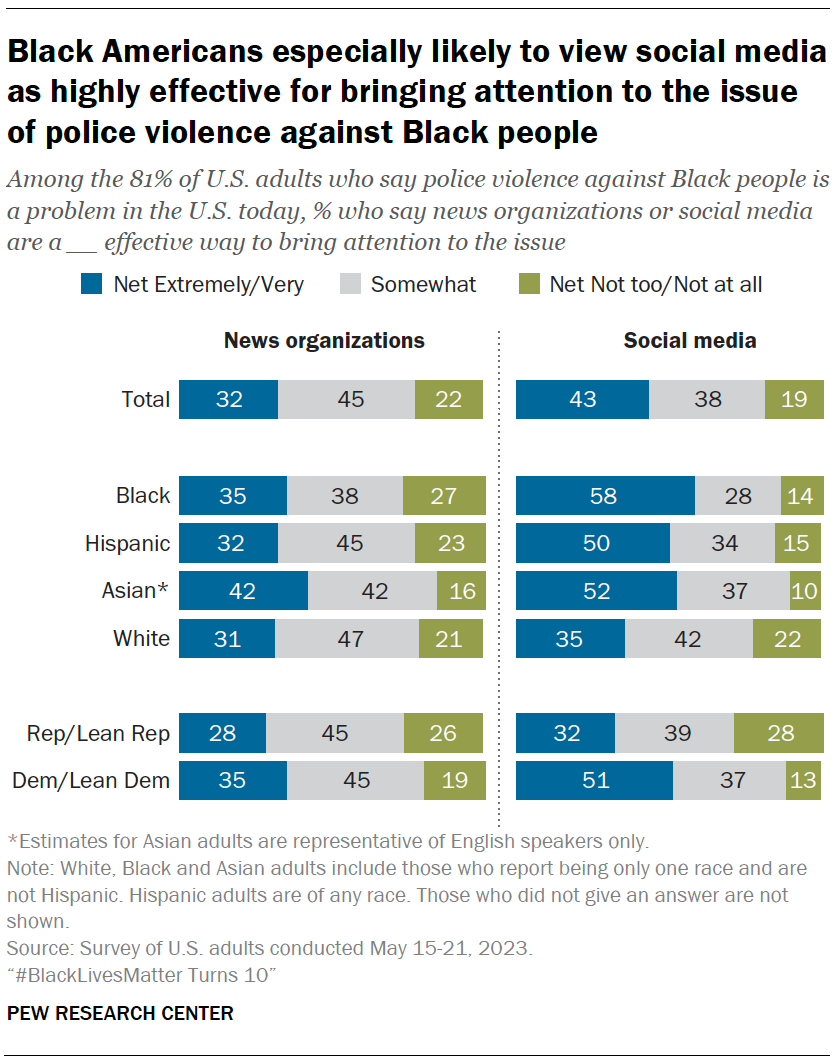
About four-in-ten Americans who view police violence against Black people as a problem (43%) say social media is an extremely or very effective way to bring attention to the issue, while a smaller share say the same about news organizations (32%).
Views on the effectiveness of social media in shedding light on this issue differ by race and ethnicity. Among White adults who view police violence against Black people as a problem, 35% say social media is extremely or very effective in bringing attention the issue, that share rises to half or more among those who are Black (58%), Asian (52%) or Hispanic (50%).
By comparison, racial and ethnic differences on news organizations’ ability to bring attention to this issue are somewhat more modest. Still, Asian adults (42%) in this group are more likely to say news organizations are extremely or very effective in bringing attention to police violence against Black people than White (31%) or Hispanic adults (32%). Black adults do not meaningfully differ from other groups.
Political party is also a factor. Democrats who think police violence against Black people is a problem are more likely than their Republican counterparts to say social media is extremely or very effective way of bringing awareness to these issues (51% vs. 32%). And while there are partisan gaps in views about news organizations’ ability to bring attention to this topic, they are far more modest.
